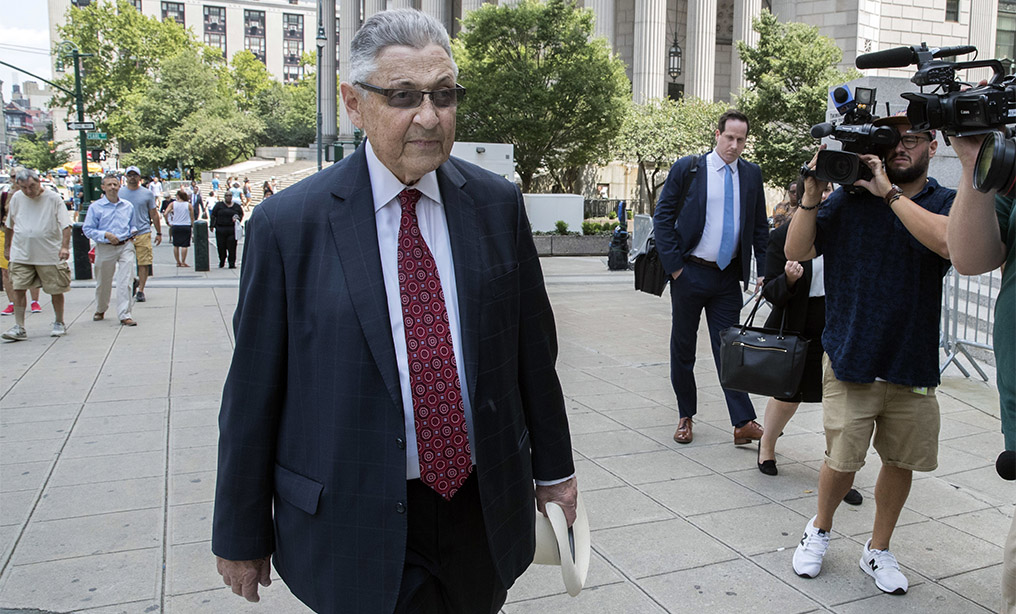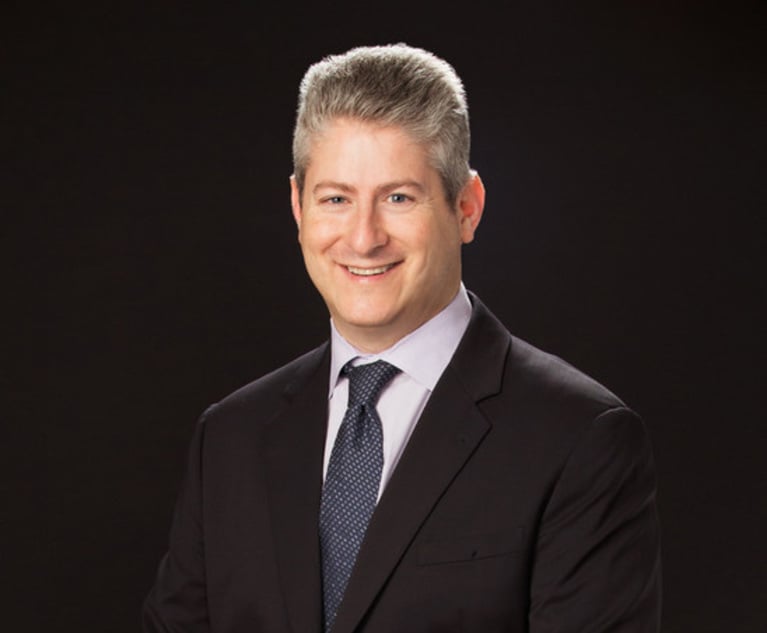Attorneys for Sheldon Silver Seek Acquittal or Third Trial for Ex-Assembly Speaker
Meir Feder, a partner with Jones Day representing Silver on appeal, argued in the brief that jurors should have been told that prosecutors had to establish a quid pro quo agreement between the former lawmaker, a researcher, and two real estate developers.
November 01, 2018 at 12:27 PM
6 minute read
 Former New York Assembly Speaker Sheldon Silver arrives at federal court on July 27. Photo: Mary Altaffer/AP
Former New York Assembly Speaker Sheldon Silver arrives at federal court on July 27. Photo: Mary Altaffer/AP
Attorneys for former State Assembly Speaker Sheldon Silver argued in a new filing with a federal appellate court that the jurors who convicted him on charges of public corruption this year were misinformed about how they should consider the elements of his case.
Meir Feder, a partner with Jones Day representing Silver on appeal, argued in the brief that jurors should have been told that prosecutors had to establish a quid pro quo agreement between the former lawmaker, a researcher, and two real estate developers.
Instead, Feder said, the district court told jurors that the intent of the alleged bribe payers was irrelevant. That instruction contradicted the U.S. Supreme Court decision in McDonnell v. United States, Feder argued. That's the same decision that convinced the Second Circuit Court of Appeals to throw out Silver's first conviction on the charges last year.
U.S. District Judge Valerie Caproni told jurors that prosecutors only had to prove that Silver—not the alleged bribe giver—understood that, as a result of the bribe, he was expected to exercise official influence or take official action, according to the filing.
“Hamstrung by these instructions (and the knowledge that any reference to an agreement element in summation would draw a sustained objection) Mr. Silver was prevented from arguing to the jury that he did not enter any agreement with Dr. Taub or the developers to exchange benefits for official acts,” Feder wrote.
But McDonnell established a different definition of an “official act” that Feder argued was not met in the prosecution's argument.
“Under McDonnell, an agreement to perform favors is not an agreement to perform official acts unless those favors are identified, at the time of the alleged exchange, with sufficient specificity to demonstrate that they qualify as 'official acts,'“ Feder wrote.
The two schemes Silver was convicted of participating in to collect almost $4 million in alleged kickbacks did not meet that description, Feder argued.
In one of those schemes, federal prosecutors alleged that Silver traded referrals of mesothelioma patients from Dr. Robert Taub, a researcher at Columbia University, for official acts. Silver received referral fees from his law firm, Weitz & Luxenberg, for each patient that Taub referred.
Prosecutors alleged that Silver, in return, approved state money for research grants for Taub and offered favors to Taub and members of his family. On one occasion, prosecutors said, Silver co-sponsored a grant to an organization that fights domestic abuse where Taub's wife served on the board. Silver also allegedly recommended Taub's children for jobs.
Feder argued that prosecutors had provided no evidence Silver traded those actions for the referrals from Taub, and that Taub, himself, had even testified to that point.
“However, Dr. Taub—who was protected by a non-prosecution agreement—testified that there had been no agreement to exchange mesothelioma leads for official acts,” Feder wrote. “Nor, according to Dr. Taub, did a quid pro quo relationship develop later. Instead, Dr. Taub felt he benefited from what he called a 'business relationship' with Mr. Silver, in which he provided patients with medical help, and 'Mr. Silver … provid[ed] them with legal help.'“
The second scheme alleged that Silver received referral fees from Goldberg & Iryami for tax certiorari work from two real estate developers, Glenwood Management and Witkoff. In exchange, prosecutors claimed that Silver approved public financing for Glenwood and supported legislation that benefited both developers.
Feder claimed in his brief that it was Jay Arthur Goldberg, named founder of Goldberg & Iryami, who first solicited Glenwood's business for the firm, not Silver. Feder said Witkoff started using the firm at Silver's suggestion, but did not enter into any agreement with Silver to use his power to benefit the developer.
Silver did vote for legislation that would benefit both developers and his designee on the Public Authorities Control Board did approve tax-exempt financing for Glenwood. But prosecutors were unable to prove that those actions were part of a quid pro quo arrangement between Silver and the developers, Feder argued.
Neither developer even knew Silver received fees for referring them until years later, he said.
“Consistent with this unawareness, the Glenwood and Witkoff witnesses testified that—although they were aware that Mr. Silver was a 'powerful man' who held authority relevant to their industry, they did not retain Goldberg in order to procure official action,” Feder wrote.
Feder's argument in both schemes was that there was never an agreement between Silver and the alleged bribe payers to exchange referral fees for an official act. The jury, meanwhile, was told by the district court that Silver could be convicted if he accepted payment without an explicit agreement to perform a specific action. That was wrong, Feder said.
“This error, too, was deeply prejudicial, in that it freed the jury of the need to find an agreement to undertake specific official acts in a case in which the only alleged official act of any substance—the approval of state research grants—occurred well outside the limitations period, and the evidence of any agreement to perform official acts within the limitations period was essentially nonexistent,” Feder argued.
Feder is asking the Second Circuit to either grant Silver a new trial, which would be his third on the charges at the district court, or acquit him on his conviction. He was sentenced in July to serve seven years in prison.
Silver was represented at the district court by Allen & Overy partner Michael Feldberg.
A spokesman for U.S. Attorney Geoffrey Berman of the Southern District of New York, whose office prosecuted Silver, said they would let future filings speak for themselves. The charges were first brought by former U.S. Attorney Preet Bharara in 2015.
READ MORE:
Attorneys for Convicted Former Assembly Speaker Sheldon Silver Begin Appeals Process
Former Assembly Speaker Sheldon Silver Sentenced to 7 Years in Prison
Silver, in Retrial, Found Guilty on All Counts of Corruption
This content has been archived. It is available through our partners, LexisNexis® and Bloomberg Law.
To view this content, please continue to their sites.
Not a Lexis Subscriber?
Subscribe Now
Not a Bloomberg Law Subscriber?
Subscribe Now
NOT FOR REPRINT
© 2025 ALM Global, LLC, All Rights Reserved. Request academic re-use from www.copyright.com. All other uses, submit a request to [email protected]. For more information visit Asset & Logo Licensing.
You Might Like
View All

Cooley Promotes NY Office Leader to Global Litigation Department Chair

NY Judge Resigns After Avoiding Jury Duty by Telling Court He Couldn't Be Impartial

Charlie Javice Jury Will Not See Her Texts About Elizabeth Holmes
Trending Stories
- 1Georgia Justices Urged to Revive Malpractice Suit Against Retired Barnes & Thornburg Atty
- 2How Gibson Dunn Lawyers Helped Assemble the LA FireAid Benefit Concert in 'Extreme' Time Crunch
- 3Lawyer Wears Funny Ears When Criticizing: Still Sued for Defamation
- 4Medical Student's Error Takes Center Stage in High Court 'Agency' Dispute
- 5'A Shock to the System’: Some Government Attorneys Are Forced Out, While Others Weigh Job Options
Who Got The Work
J. Brugh Lower of Gibbons has entered an appearance for industrial equipment supplier Devco Corporation in a pending trademark infringement lawsuit. The suit, accusing the defendant of selling knock-off Graco products, was filed Dec. 18 in New Jersey District Court by Rivkin Radler on behalf of Graco Inc. and Graco Minnesota. The case, assigned to U.S. District Judge Zahid N. Quraishi, is 3:24-cv-11294, Graco Inc. et al v. Devco Corporation.
Who Got The Work
Rebecca Maller-Stein and Kent A. Yalowitz of Arnold & Porter Kaye Scholer have entered their appearances for Hanaco Venture Capital and its executives, Lior Prosor and David Frankel, in a pending securities lawsuit. The action, filed on Dec. 24 in New York Southern District Court by Zell, Aron & Co. on behalf of Goldeneye Advisors, accuses the defendants of negligently and fraudulently managing the plaintiff's $1 million investment. The case, assigned to U.S. District Judge Vernon S. Broderick, is 1:24-cv-09918, Goldeneye Advisors, LLC v. Hanaco Venture Capital, Ltd. et al.
Who Got The Work
Attorneys from A&O Shearman has stepped in as defense counsel for Toronto-Dominion Bank and other defendants in a pending securities class action. The suit, filed Dec. 11 in New York Southern District Court by Bleichmar Fonti & Auld, accuses the defendants of concealing the bank's 'pervasive' deficiencies in regards to its compliance with the Bank Secrecy Act and the quality of its anti-money laundering controls. The case, assigned to U.S. District Judge Arun Subramanian, is 1:24-cv-09445, Gonzalez v. The Toronto-Dominion Bank et al.
Who Got The Work
Crown Castle International, a Pennsylvania company providing shared communications infrastructure, has turned to Luke D. Wolf of Gordon Rees Scully Mansukhani to fend off a pending breach-of-contract lawsuit. The court action, filed Nov. 25 in Michigan Eastern District Court by Hooper Hathaway PC on behalf of The Town Residences LLC, accuses Crown Castle of failing to transfer approximately $30,000 in utility payments from T-Mobile in breach of a roof-top lease and assignment agreement. The case, assigned to U.S. District Judge Susan K. Declercq, is 2:24-cv-13131, The Town Residences LLC v. T-Mobile US, Inc. et al.
Who Got The Work
Wilfred P. Coronato and Daniel M. Schwartz of McCarter & English have stepped in as defense counsel to Electrolux Home Products Inc. in a pending product liability lawsuit. The court action, filed Nov. 26 in New York Eastern District Court by Poulos Lopiccolo PC and Nagel Rice LLP on behalf of David Stern, alleges that the defendant's refrigerators’ drawers and shelving repeatedly break and fall apart within months after purchase. The case, assigned to U.S. District Judge Joan M. Azrack, is 2:24-cv-08204, Stern v. Electrolux Home Products, Inc.
Featured Firms
Law Offices of Gary Martin Hays & Associates, P.C.
(470) 294-1674
Law Offices of Mark E. Salomone
(857) 444-6468
Smith & Hassler
(713) 739-1250






